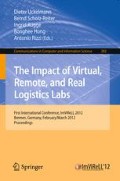Abstract
The employment of simulation tools is the established method to analyze and validate research results. Generally, simulation tools can represent certain key characteristics or behaviors of a selected real-life or abstract system. However, these tools simplify approximations and assume relevant information. Today, most research areas are interdisciplinary. Therefore, the presentation and validation of collective results are a difficult challenge. Demonstrators and prototypes consider these difficulties and relevant factors, which can range from determining the required data sources to the employment of technological devices. The research domain “Autonomous Logistics” is such an interdisciplinary research domain, which focuses on the decentralization of decision-making processes. The showcase demonstrator “factory of autonomous products” is a development of this research domain. This paper introduces this showcase from the demonstrator perspective and proves the benefits.
Access this chapter
Tax calculation will be finalised at checkout
Purchases are for personal use only
Preview
Unable to display preview. Download preview PDF.
References
Sokolowski, J.A., Banks, C.M.: Principles of Modeling and Simulation: A Multidisciplinary Approach. John Wiley & Sons, Hoboken (2009)
Sherman, W.R., Craig, A.B.: Understanding Virtual Reality. Morgan Kaufmann, San Francisco (2003)
Davidsson, P.: Multi Agent Based Simulation: Beyond Social Simulation. In: Moss, S., Davidsson, P. (eds.) MABS 2000. LNCS (LNAI), vol. 1979, pp. 97–107. Springer, Heidelberg (2001)
Van Dyke Parunak, H., Savit, R., Riolo, R.L.: Agent-Based Modeling vs. Equation-Based Modeling: A Case Study and Users’ Guide. In: Sichman, J.S., Conte, R., Gilbert, N. (eds.) MABS 1998. LNCS (LNAI), vol. 1534, pp. 10–25. Springer, Heidelberg (1998)
Hülsmann, M., Windt, K.: Understanding Autonomous Cooperation and Control in Logistics: The Impact of Autonomy on Management, Information, Communication and Material Flow. Springer, Berlin (2007)
Scholz-Reiter, B., Hildebrandt, T., Kolditz, J., Höhns, H.: Selbststeuerung in der Produktion – ein Modellierungskonzept. Ind. Manag. 21(4), 33–36 (2005)
Wiendahl, H.-P., Gers, D., Keunecke, L. (eds.): Variantenbeherrschung in der Montage: Konzept und Praxis der flexiblen Produktionsendstufe. Springer, Berlin (2004)
Scholz-Reiter, B., Windt, K., Kolditz, J., Böse, F., Hildebrandt, T., Philipp, T., Höhns, H.: New Concepts of Modelling and Evaluating Autonomous Logistics Processes. In: Chryssolouris, G., Mourtzis, D. (eds.) Manufacturing, Modelling, Management and Control 2004. IFAC Workshop Series, Elsevier Science, Amsterdam (2005)
Windt, K., Jeken, O.: Allocation Flexibility – A New Flexibility Type as an Enabler for Autonomous Control in Production Logistics. In: 42nd CIRP Conference on Manufacturing Systems, Grenoble (2009)
Meyer, G.G., Främling, K., Holmström, J.: Intelligent products: A survey. Comput. Ind. 60(3), 137–148 (2009)
Kirn, S., Herzog, O., Lockemann, P., Spaniol, O. (eds.): Multiagent Engineering: Theory and Applications in Enterprises. Springer, Berlin (2006)
Hackstein, R.: Produktionsplanung und -steuerung (PPS) – Ein Handbuch für die Betriebspraxis. VDI-Verlag, Düsseldorf (1989)
Scholz-Reiter, B., Görges, M., Philipp, T.: Autonomously controlled production systems – Influence of autonomous control level on logistic performance. CIRP Ann. Manuf. Technol. 58, 395–398 (2009)
Ganji, F., Morales Kluge, E., Scholz-Reiter, B.: Bringing Agents into Application: Intelligent Products in Autonomous Logistics. In: Artificial Intelligence and Logistics (AILog) – Workshop at ECAI 2010 (2010)
Pille, C.: Produktidentifikation, Intralogistik und Plagiatschutz – RFID-Integration in Gussbauteile. In: BDG-Fachtagung Gussteilkennzeichnung. Methoden und Datenmanagement – Praxisberichte, pp. V/1–V/4. VDG Akademie, Essen (2010)
Foundation for Intelligent Physical Agents (Fipa): Standard Status Specifications, http://www.fipa.org/repository/standardspecs.html
Author information
Authors and Affiliations
Editor information
Editors and Affiliations
Rights and permissions
Copyright information
© 2012 Springer-Verlag Berlin Heidelberg
About this paper
Cite this paper
Ganji, F., Veigt, M., Scholz-Reiter, B. (2012). Prototyping in Research Domains: A Prototype for Autonomous Production Logistics. In: Uckelmann, D., Scholz-Reiter, B., Rügge, I., Hong, B., Rizzi, A. (eds) The Impact of Virtual, Remote, and Real Logistics Labs. ImViReLL 2012. Communications in Computer and Information Science, vol 282. Springer, Berlin, Heidelberg. https://doi.org/10.1007/978-3-642-28816-6_9
Download citation
DOI: https://doi.org/10.1007/978-3-642-28816-6_9
Publisher Name: Springer, Berlin, Heidelberg
Print ISBN: 978-3-642-28815-9
Online ISBN: 978-3-642-28816-6
eBook Packages: Computer ScienceComputer Science (R0)

